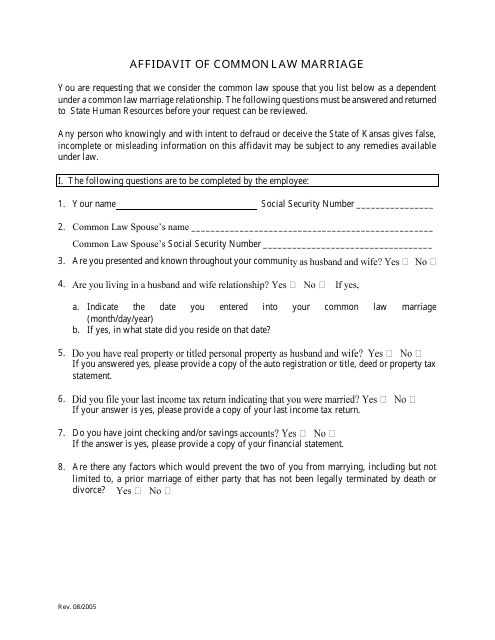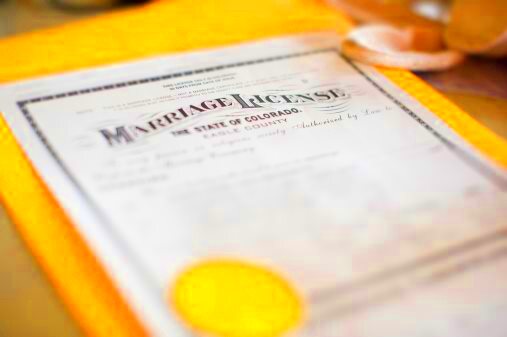Recognizing Common Law Marriage in Kansas
Common law marriage could be slightly puzzling particularly for those who aren’t used to it in Kansas. The recognition of a common law marriage is obtained through the actions and intentions of a couple as opposed to a traditional marriage that needs an elaborate ceremony and a license. Such marriages legally exist in Kansas but there are criteria which must be fulfilled before one can qualify for them. Therefore, it would be appropriate to analyse better what this entails for couples living in Kansas.
Requirements for Establishing Common Law Marriage

In Kansas, for legal marriage under common law to happen; couples have to fulfill some prerequisites. Below are the primary measures:
- Mutual Agreement: Both partners must agree to be married. This agreement can be verbal or implied through their actions.
- Cohabitation: The couple must live together for a significant period. There is no set timeframe, but it should be long enough to demonstrate a shared life.
- Intent to Marry: Both individuals must intend to be married. This intent can be shown through various actions, such as introducing each other as spouses or using the same last name.
It must be emphasized that simply living together does not necessarily indicate that you are in a common law marriage. There should be strong evidence to demonstrate your intention to marry.
Legal Recognition of Common Law Marriage
In Kansas, the common law marriage is legally recognized, which implies that couples meeting the set requirements can enjoy similar rights and duties as those in a conventional marriage. A few essential issues concerning legal acknowledgment are as follows:
- Legal Rights: Common law spouses have the right to inherit from one another, receive spousal benefits, and make medical decisions for each other.
- Child Custody and Support: In cases of separation, common law couples have the same rights regarding child custody and support as formally married couples.
- Property Division: If the relationship ends, common law spouses are entitled to a fair division of shared property.
But it is difficult to establish a common law marriage, especially if one of the partners disputes this fact. Your assurance might gain strength with documents and well defined factors based on the relationship.
Rights and Responsibilities of Common Law Couples
In Kansas, couples who live together as if they were married have rights similar to those married formally. Couples should learn about their rights so that they can manage their relationships better and deal with legal issues if they come up. It is important to note that common law marriage is real and taken seriously by the law.
Here are certain fundamental privileges and obligations that couples in common law marriage possess:
- Inheritance Rights: Common law spouses can inherit property from each other without a will, just like formally married couples.
- Health Care Decisions: If one partner becomes incapacitated, the other has the right to make medical decisions on their behalf.
- Tax Benefits: Common law couples can file joint tax returns, which may provide financial benefits.
- Financial Obligations: Both partners share the responsibility for debts incurred during the relationship, similar to a formal marriage.
The importance of rights is one thing while that of responsibilities is another. It is necessary for partners in a marriage to provide each other with emotional and financial aid while amicably solving disagreements.
Differences Between Common Law and Formal Marriage
Although they may appear to be alike, common law marriage and official marriage are different in several ways. Therefore, it is important for couples to understand these differences so that they can appropriately determine the direction their relationship should take.
| Aspect | Common Law Marriage | Formal Marriage |
|---|---|---|
| Formation | Established through mutual agreement and cohabitation | Requires a marriage license and a ceremony |
| Documentation | No formal documents needed | Marriage certificate is issued |
| Legal Process | Can be harder to prove in legal situations | Easier to prove with a marriage certificate |
| Ending the Relationship | May require proving the marriage existed | Requires legal divorce proceedings |
Recognizing the dissimilarities enables partners to come up with well-informed choices concerning their unions and any impending legal consequences.
How to Prove a Common Law Marriage
It might be somewhat difficult to prove a common law marriage in Kansas, particularly when there is a legal confrontation about it. Evidence to support your assertion must be gathered importantly. Below is how to establish that one is in common law marriage:
- Shared Documents: Gather documents that show shared finances, such as joint bank accounts, property titles, or leases.
- Affidavits from Friends and Family: Statements from people who can attest to your relationship can help demonstrate your intent to be married.
- Social Media Evidence: Posts that indicate your commitment to each other, such as using terms like “husband” or “wife,” can serve as proof.
- Tax Returns: If you filed jointly, this can be strong evidence of a recognized relationship.
The open relationships are difficult to understand, but one needs to keep in mind that it helps in making their position clear; thus preserving what was originally theirs.
Ending a Common Law Marriage
In Kansas, terminating a common law marriage can be an intricate procedure because it is akin to dissolving a formal marriage. There is a misconception held by many people that divorce only affects traditional marriages but even common law couples must adhere to some legal guidelines during their separation. Therefore, it is important to handle this exercise carefully so as to safeguard your rights and interests.
These are the key factors to think about when terminating a common law marriage:
- Separation: The first step is to separate from your partner. Unlike formal marriages, there’s no requirement for legal separation in common law marriages.
- Document Your Intent: Make it clear that you intend to end the relationship. This can involve communication with your partner or shared friends and family.
- Property Division: Just like with a divorce, you may need to divide any shared property or assets. This can be complicated without a formal agreement, so be prepared to negotiate.
- Custody and Support: If you have children, determine custody arrangements and child support obligations, similar to what would happen in a traditional divorce.
In Kansas, enlisting a lawyer who specializes in family law will definitely help you navigate the process as well as make sure that all your legal rights are safeguarded.
Frequently Asked Questions about Common Law Marriage in Kansas
In relation to common law marriage in Kansas, people often ask several questions. The answers to some of these frequently asked questions include:
- Is common law marriage legal in Kansas? Yes, common law marriage is recognized in Kansas if certain criteria are met.
- How long do you have to live together to be considered married? There’s no specific timeframe; it depends on the couple’s intent and behavior.
- Do you need to file any paperwork for common law marriage? No, there’s no need for a marriage license or formal documents, but having evidence can help.
- Can you get divorced if you had a common law marriage? Yes, you can go through divorce proceedings to separate legally, just like in a formal marriage.
- What if one partner denies the common law marriage? In this case, you may need to provide evidence to prove your relationship status.
By comprehending these Frequently Asked Questions (FAQs), you will get better clarity about common law marriages and their associated implications in Kansas state.
Conclusion on Common Law Marriage in Kansas
In Kansas, common law marriage is an authentic legal standing that provides couples with some similar rights and responsibilities as officially recognized marriages. Although it may give couples peace of mind, comprehending its functionality is vital for those who take the route. Whether you are starting a common law marriage or thinking about ending one, knowing your entitlements and duties is critical.
If the lawyer knows the law surrounding your state, it is best to seek them or their advisory on whether or not you should make a decision. It is very important for you to know how secure or insecure are you legally so that in case there is an issue at hand, you can also be armed with some necessary details like when starting or ending a relationship. One should always take time and read all available information before making any conclusions.


